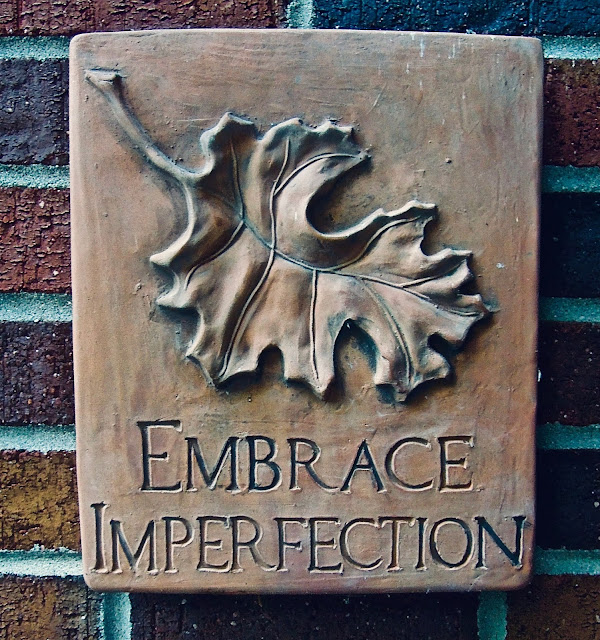
Confessions of a recovering perfectionist
“Perfectionism is the voice of the oppressor, the enemy of the people. It will keep you cramped and insane your whole life.” ~Anne Lamott
I ordered the garden plaque as soon as I saw it in a mail-order catalog. Crafted from terra cotta, it announces in bold letters: EMBRACE IMPERFECTION.
Today the plaque hangs on a brick wall just outside my garden room window, where I can view its reassuring message every day. Come to think of it, I should have ordered duplicates to use as decorative reminders throughout the house.
I’ve battled perfectionism most of my life. My finely honed nit-picking skills — inherited from my mother — serve me well on occasion. They come in handy when I’m editing an article or trying a difficult recipe, for instance. But most of the time they make me crabby, unsatisfied, or miserable.
“Understanding the difference between healthy striving and perfectionism is critical to laying down the shield and picking up your life,” warns Brene Brown in The Gifts of Imperfection. “Research shows that perfectionism hampers success. In fact, it’s often the path to depression, anxiety, addiction, and life paralysis.”
Perfectionism is the snarky little gremlin hissing in my ear when the floors are decorated with muddy dog-paw prints and last Sunday’s newspapers. It reminds me that I’m a lousy housekeeper and forbids me to invite company until everything in sight is spotless.
Perfectionism is the critical woman staring back at me in the full-length mirror – the mean gal who insists that my shirt looks frumpy or that my butt is too big for my skinny jeans.
Perfectionism is the imaginary editor looking over my shoulder while I type. She humiliates me when I’ve made a typo or an error of grammar. I’m an imposter, not a real writer, she says.
Late at night, Perfectionism rouses me from sleep like a Dickensian ghost, announcing that my life is nearly over and I haven’t accomplished enough.
Embracing what’s real
Most of the time, I’m not as hard on others. I prefer good character and kindness over perfect style and status — and I’ve always enjoyed people who don’t take themselves too seriously. I love the history revealed in the scratches on a piece of well-loved furniture. Thrift-store finds, overgrown cottage gardens, pets without pedigrees, wrinkles, and crooked smiles intrigue me.
So why are we perfectionists so hard on ourselves?
Growing up, I was told that if you can’t do something perfectly, it’s not worth doing at all. (If that doesn’t kill your enthusiasm from the get-go, it’ll soon drive you nuts.) So, like most budding perfectionists, I stopped coloring outside the lines. Avoiding criticism, I used to drop classes and hobbies when I couldn’t excel in them.
My epiphany came years later. On a travel-writing assignment for a magazine, I visited an Amish community that was known for crafting exquisite quilts. There, I was told that early Mennonite quilters always stitched a “humility patch” – a deliberate mistake — into each of their quilts, reminding us that only the Creator can design a flawless masterpiece. Imagine that.
Over the years, the quilt of my life has acquired several humility patches, but I’ve come to accept the humanity in making mistakes or missing the mark. Sometimes “good enough” is enough.
To embrace imperfection is to let go of the need to be right, or look brilliant, all of the time. As my garden plaque reminds me, messes and mistakes are proof that real life is unfolding here. And even when I can’t fully embrace imperfection, I can try, at least, to shake hands with it. ~Cindy La Ferle
—Parts of this essay originally appeared in slightly different form in my book, Writing Home.
 |



2 Comments
Bob Wonnacott
Thank you for posting this story on imperfection. I can totally relate to your early years, as my mother believed that doing things perfectly was the only acceptable way. I still find it a very hard trait to overcome. At this late age, I still find that perfectionism still haunts me. Thanks again for showing that it can be overcome!
Things that make me happy
Thanks for your reflections, Bob. I still battle perfectionism — but being aware of it is half the battle 🙂